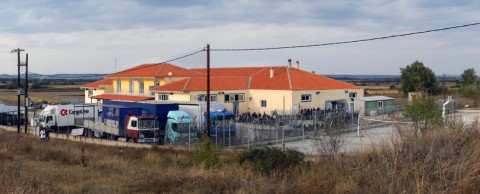Accounts from the Inside: The Detention Centres of Evros
new report by Pro Asyl

Obviously, Europe’s main concern is the creation of »walls« in order to hinder or to prevent the access to its territory. Physical walls like the fence, the moat and border controls in Evros but also invisible walls that are constituted by the lack of protection to those in need, rights denials, systematic detention, detention and living conditions violating human dignity, Readmission Agreements and the Dublin II Regulation. The effects of these heightening walls have their most tragic face in the many lost and dead at border. This is why we chose to speak about walls of shame in this report.
Archive for the 'Evros' Category
New report of Infomobile Greece, published in January 2012
LOST AT BORDER reports on the reality of loss and death at the Greek borders. As a close friend of ours said once: “If you are a refugee and you die nobody asks any questions. But for living somewhere, everybody is questioning you!” We want to break the silence and ask: What happened with all these people whose traces got lost?
Accidents and death at border belong unfortunately to the daily experiences of refugees trying to reach a safe haven. The European Border Control Agency FRONTEX in co-operation with national authorities are heightening and thickening the fences and walls around us, controlling and patrolling the borders and externalizing them to European neighbour states such as Turkey, Morocco, Tunisia a.o.  They have created treaties of co-operation in deportations and huge refugee detention camps at the gates of Europe. Trying to cross a number of borders, among them the ones of Fortress Europe is a huge risk of death! The numbers are shocking: more than 2.000 people died in the Mediterranean Sea only in 2011. Each single person left behind a big gap in the life of relatives and friends.
They have created treaties of co-operation in deportations and huge refugee detention camps at the gates of Europe. Trying to cross a number of borders, among them the ones of Fortress Europe is a huge risk of death! The numbers are shocking: more than 2.000 people died in the Mediterranean Sea only in 2011. Each single person left behind a big gap in the life of relatives and friends.
LOST AT BORDER gives the voice mainly to refugees searching and mourning for their beloved. The report was made by a group of antiracist activists from different countries who have been already involved in the search of migrants who got lost at the border between Greece and Turkey. It can be quite difficult to find information on what has happened when somebody is missing at the border. Apart from the report we want to help and fill this information gap by a new Blog. We want to connect the relatives and friends of border victims to each other and we want to let you know and feel that you are not alone on this journey! We will never forget. We promise to overcome the murderous border regime and to continue our struggle for a welcoming Europe.
download lostatborder report
LOST AT BORDER – Blog
Report and Blog have been published by Infomobile
from afghanistan 6 days here what the broblem?
asks young Hamis Abdalah Ghasmi from Afghanistan on a piece of cardboard that was slipped to our delegation in Fylakio. And indeed, it is the question all migrants in detention in the Evros region have in mind: Why am I being kept here?
Yesterday, i.e. Saturday, the 18th of December 2010, saw a mobilisation from the Greek antiracist movement to the Evros region, where most of the border crossings happened the last months and where many hundreds of migrants are being detained under comparably horrible circumstances as in the infamous prison of Pagani.
Our friends from Clandestina alert us to the fact that…
…last Tuesday (4th of December), a riot broke out, one of the most serious to date, at the detention centre at Fylakion in the Evros region, near the town of Orestiada and the FRONTEX headquarters at the Greco-Turkish border. According to the policemen guarding the centre, the sans papiers immigrants short-circuited the electricity network causing a blackout, blocked the sewer system causing the overflow of waste and caused minor damages to the centre’s building.
Special police forces were called in from Orestiada and the sans papiers welcomed them by throwing chlorine detergent at them. They had been supplied bottles of chlorine so that they keep the prison clean by themselves, since no cleaning service is provided for the 3-year old detention centre, where up to 1000 refugees, including families with small children, are being held in a building designed to temporarily host 350 people at a time – with bad water, few toilets, no showers, and no medical or legal help.
During the riot, four sans papiers are said to have escaped.
picture credit: image of Fylakio detention centre taken from wikipedia
…in Greece within the last year:
by Infomobile
- 19th September – 22nd October 2009:
After a number of revolts inside the detention centre Pagani on Lesvos island, the prison was finally officially closed and the last refugees left to Athens. Huge numbers of refugees had been imprisoned in the overcrowded prison all over the summer, leading to repeated uprisings. The refugees demanded freedom through hunger strikes, broke the doors of the cells and put the cells on fire. The revolts gained a lot of public attention and media coverage through the noborder action Lesvos 2009. - 3rd February 2010:
Refugees detained in Venna put fire on their clothes and mattresses to protest against their prolonged imprisonment and the inhuman detention conditions. Only three days later 42 of them were judged penalties of 4-6 months detention and following deportation without having any access to lawyers and interpreters. Then they were transferred to other prisons in order to isolate them. - 13th March:
In the night of 13th March 2010, 35 detainees set the detention centre of the police station of Patras on fire to protest against their detention and the detention conditions. -
13th–17th April:
124 detained refugees started a hunger strike in the detention centre of Samos protesting against the transfer of 60 refugees from Samos detention centre to a prison close to the Bulgarian border and to protest against their deportation
Continue reading ‘Short history of hunger strikes by refugees’
We are monitoring the situation around the upcoming RABIT deployment to Greece. As it seems, Greece has requested 160 175 officers to be sent to Greece.
- Denmark will contribute five to six officers, which will be able to travel within the next four days.
- Sweden will contribute
a handful
of officers. - France has announced to mobilise the entire French RABIT pool.
- Update 2, 4.11.2010:
- Germany has announced to provide up to 40 officers, plus 7 patrol cars and 4 thermo vision vans (source: Sueddeutsche Zeitung, 4.11.2010)
- The Netherlands will send 14 officers of the Royal Military Police (RMP) and 2 officers of the Rotterdam Seaport Police. These 16 will be in action until December 1 and will then be replaced by other Dutch units.
Update 30.10.2010: Frontex released a third press statement. They will deploy 175 border guards and a additional technical equipment:
In total, 175 border-control specialists have been made available by the 26 Member States and Schengen-Associated Countries participating in the first ever RABIT deployment. Joint Operation (JO) RABIT 2010 will also see an unprecedented quantity of technical equipment and other logistical and administrative support. All the costs incurred by Member States in relation to the deployment will be reimbursed by Frontex.
The specialisations of guest officers deployed will include experts in false documents, clandestine entry, first and second-line border checks and stolen vehicles as well as dog handlers and specialist interviewers, debriefers and interpreters. All RABIT officers receive mandatory human rights awareness training as part of their RABIT training by Frontex and in addition, special briefings will be held on the spot as a provision of JO RABIT 2010.
The deployment is scheduled to commence on 2 November 2010, with an anticipated duration of up to two months.
- 1 Helicopter (Romania)
- 1 Bus (Romania)
- 5 Minibuses (1 Romania, 2 Austria, 1 Bulgaria, 1 Hungary)
- 19 Patrol cars (4WD) (7 Romania, 3 Austria, 2 Slovakia, 7 Germany)
- 9 Thermo Vision Vans (2 Austria, 2 Bulgaria, 4 Germany, 1 Hungary)
- 3 Schengen buses (1 Austria, 2 Hungary)
- 3 office units from Denmark
Developing story, we will update this post.
Frontex has granted the request of the Greek government for the deployment of the Rapid Border Intervention Teams in the Evros border.
From their press release (25th of October 2010):
The deployment of European border guard forces at the Greek-Turkish border increases the danger of readmitting refugees to Turkey and from there to their country of origin, where they are put at risk of facing human rights violations. The European Union should meet its obligations and ensure refugees’ protection and well-being.
Greece requested the European Union to send armed so called Frontex Rapid Border Intervention Teams (RABITs) to the Greek-Turkish border. This became public on Monday the 25th of October 2010.
Greek government statistics state that irregular migration has been increasing in the Evros-Region where the land broder to Turkey stretches over 12 km. According to the Greek Minister of Citizens’ Protection Christos Papoutsis only during the first October weekend of this year 1,400 refugees have been intercepted in that region.
Continue reading ‘Frontex Rapid Border Intervention Teams to patrol the Evros border’
A report on the refugees’ situation in Greece from an external source, and embedding doesn’t work either. You can find the video at youtube.





